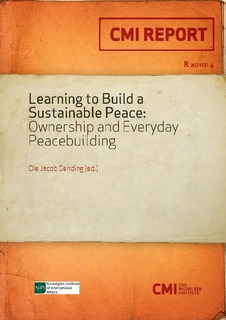| dc.contributor.author | Sending, Ole Jacob (ed.) | |
| dc.date.accessioned | 2010-04-05T04:18:18Z | |
| dc.date.accessioned | 2017-03-29T09:13:17Z | |
| dc.date.available | 2010-04-05T04:18:18Z | |
| dc.date.available | 2017-03-29T09:13:17Z | |
| dc.date.issued | 2010 | |
| dc.identifier.isbn | 978-82-8062-393-5 | |
| dc.identifier.issn | 1890-503X | |
| dc.identifier.uri | http://hdl.handle.net/11250/2436086 | |
| dc.description.abstract | Lack of local ownership is seen as a central explanation for why peacebuilding efforts often fail to yield sustainable peace dividends. But how is local ownership understood and acted upon by those who are engaged in peacebuilding efforts at the country level? Based on research in four countries – Afghanistan, Haiti, Liberia and Sudan – this study finds that the way ownership is operationalized by external actors at the country level is quite different from how it is defined in policy documents. The most prevalent operationalization is ownership as a conditional right with external actors seeing ownership as theirs to give to local actors when certain conditions (such as capacity or responsibility) are met. The result is often that reform efforts are unsustainable. This report suggests some concrete steps that can be taken to render ownership an operational principle. | |
| dc.language.iso | eng | |
| dc.publisher | Crh. Michelsen Institute | |
| dc.relation.ispartofseries | Research report | |
| dc.relation.ispartofseries | R 2010: 4 | |
| dc.subject | Peace building | |
| dc.subject | Afghanistan | |
| dc.subject | Haiti | |
| dc.subject | Liberia | |
| dc.subject | Sudan | |
| dc.title | Learning to build a sustainable peace: Ownership and everyday peacebuilding | |
| dc.type | Research report | |
